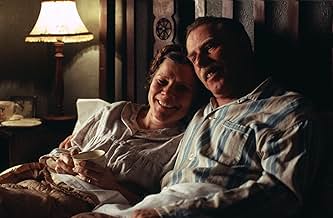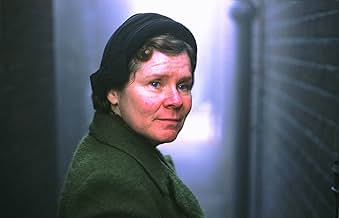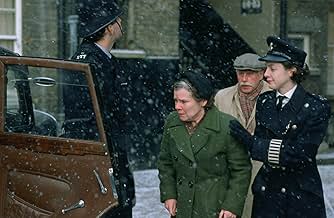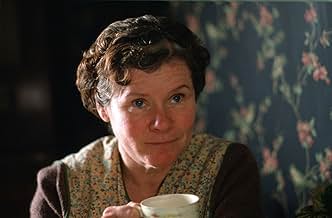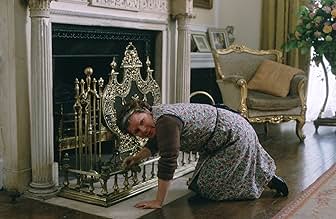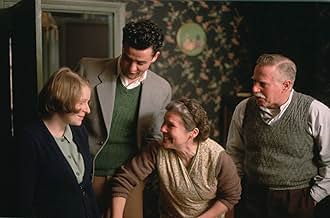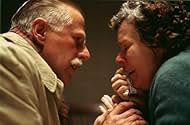CALIFICACIÓN DE IMDb
7.6/10
28 k
TU CALIFICACIÓN
Vera Drake considera que sus creencias y prácticas abortistas son contrarias a las costumbres de la Gran Bretaña de los años 50, un conflicto que conduce a la tragedia de su familia.Vera Drake considera que sus creencias y prácticas abortistas son contrarias a las costumbres de la Gran Bretaña de los años 50, un conflicto que conduce a la tragedia de su familia.Vera Drake considera que sus creencias y prácticas abortistas son contrarias a las costumbres de la Gran Bretaña de los años 50, un conflicto que conduce a la tragedia de su familia.
- Dirección
- Guionista
- Elenco
- Nominado a 3 premios Óscar
- 41 premios ganados y 45 nominaciones en total
Sinead Matthews
- Very Young Woman
- (as Sinéad Matthews)
- Dirección
- Guionista
- Todo el elenco y el equipo
- Producción, taquilla y más en IMDbPro
Opiniones destacadas
In the early 1950's, Britain is still very much recovering from the war years and the working classes are very much held together by salt-of-the-earth types supporting their families and others. One such woman is Vera Drake; mother, wife, carer, cleaner and part-time back-street abortionist. Vera takes no money for her work and simply wishes to give them the help that they cannot afford to get through legitimate channels. However not everyone shares her view of abortion and it is only a matter of time before Vera's work comes to the attention of the authorities.
Bearing in mind that this film being mentioned in the Oscars, Baftas and general glowing support of critics, it is easy to forget that it raced through the UK's multiplexes so quickly that I had to wedge myself into a sold-out art-house cinema just to see it (sold out, that is, on an afternoon screening). It is even easier to forget that fewer than 1000 people have even voted for this title as I write this review. Certainly watching it yesterday it is easy to understand why it is feted by critics but not the choice of thousands of teenagers for a Saturday night at the movies, because it is a very slow, difficult film that is far from being a bundle of laughs. However it is still a fascinating film throughout even if it is not as strong as could have been expected. The story is basic and it can't quite fill the time, maybe down to the way it was written that is, it was written as a frame and the dialogue was improvised and workshopped rather than scripted in the traditional fashion (hence Leigh's surprise at one of his Oscar nominations!).
While this weakens the story a little, it seems to have produced great performances from the cast that do more than cover for the slow pace. Staunton is superb and she stands out in the best actress category. She is a complex character that the film never easily pigeonholes and it shows how balanced the film is in the way we are not swayed in her favour by her character whenever her morals come under fire. The film is very much hers and she is totally convincing in her character. She is well supported by natural performances from Graham, Davis, Marsan and Mays among others. Leigh's direction is very intimate and, with sets and costumes, he has painted a convincingly downbeat view of post-war Britain that looks good and adds to the realistic feel of the film.
The film had a lot less debate than I had expected and it doesn't really come down on either side of the abortion issue; I guess that it is better that it leaves it to us to think over rather than preaching to us how nice (and unusual) to be treated like adults by a film. Overall though, it is the story and Vera herself that make the film so involving, the story is well framed and the workshop approach has produced some very good performances, particularly from Staunton, who outshines all others nominated alongside her in the Oscars. Deserves to be seen by larger audiences than it has had thus far, but just don't expect it to be fast-paced, fun or gripping it is much more than that.
Bearing in mind that this film being mentioned in the Oscars, Baftas and general glowing support of critics, it is easy to forget that it raced through the UK's multiplexes so quickly that I had to wedge myself into a sold-out art-house cinema just to see it (sold out, that is, on an afternoon screening). It is even easier to forget that fewer than 1000 people have even voted for this title as I write this review. Certainly watching it yesterday it is easy to understand why it is feted by critics but not the choice of thousands of teenagers for a Saturday night at the movies, because it is a very slow, difficult film that is far from being a bundle of laughs. However it is still a fascinating film throughout even if it is not as strong as could have been expected. The story is basic and it can't quite fill the time, maybe down to the way it was written that is, it was written as a frame and the dialogue was improvised and workshopped rather than scripted in the traditional fashion (hence Leigh's surprise at one of his Oscar nominations!).
While this weakens the story a little, it seems to have produced great performances from the cast that do more than cover for the slow pace. Staunton is superb and she stands out in the best actress category. She is a complex character that the film never easily pigeonholes and it shows how balanced the film is in the way we are not swayed in her favour by her character whenever her morals come under fire. The film is very much hers and she is totally convincing in her character. She is well supported by natural performances from Graham, Davis, Marsan and Mays among others. Leigh's direction is very intimate and, with sets and costumes, he has painted a convincingly downbeat view of post-war Britain that looks good and adds to the realistic feel of the film.
The film had a lot less debate than I had expected and it doesn't really come down on either side of the abortion issue; I guess that it is better that it leaves it to us to think over rather than preaching to us how nice (and unusual) to be treated like adults by a film. Overall though, it is the story and Vera herself that make the film so involving, the story is well framed and the workshop approach has produced some very good performances, particularly from Staunton, who outshines all others nominated alongside her in the Oscars. Deserves to be seen by larger audiences than it has had thus far, but just don't expect it to be fast-paced, fun or gripping it is much more than that.
One observation: When the police arrive at the home of Vera Drake (Imelda Staunton) to confront her about the allegation that she has been conducting illegal abortions, she and her family are celebrating her daughter's engagement. When the cops enter the room, the camera freezes on Vera's face. Over the course of about 45 seconds in which she doesn't say a word, Staunton's face registers every possible emotion: Joy, confusion, concern, fear, disgust, anger, guilt. It's heart-racing just to watch, and it's what acting -- great acting at least -- is all about. Staunton's is the one female performance of the year not to miss. (On the men's side, check out Morgan Freeman in MILLION DOLLAR BABY.)
I have been a longtime fan of Mike Leigh, always fascinated to see his slice of life take on England. Because of his well known creative process, the intrigue would be to see the actors and the characters and dramas (and comedies) they created. They were always worth watching in a voyeuristic way due to Leigh's unobtrusive camera work.
Vera Drake is well worth seeing for these same reasons, but Leigh has made a bigger and better movie than ever before, even with all of Topsy Turvy's bombast. His ambitions as director are greater than ever. First of all, to take on the subject of abortion is very brave. But I'll leave that for others to discuss. What was of interest to me from the opening shot was that this was going to be a visual tour de force, and it was.
Painting the scenes in dark, crushing browns and greens, with tight camera angles or letting the light in, each scene had the feel of a well thought out canvas, even the cut aways between scenes were new, inventive and beautiful.
And the acting is great and the scenes of the family interacting in close quarters, moving in synch are so pitch perfect you feel they have been doing this for decades.
So if you're thinking of seeing this movie, sit back, relax, and prepare to be taken on a slow, masterful ride.
Vera Drake is well worth seeing for these same reasons, but Leigh has made a bigger and better movie than ever before, even with all of Topsy Turvy's bombast. His ambitions as director are greater than ever. First of all, to take on the subject of abortion is very brave. But I'll leave that for others to discuss. What was of interest to me from the opening shot was that this was going to be a visual tour de force, and it was.
Painting the scenes in dark, crushing browns and greens, with tight camera angles or letting the light in, each scene had the feel of a well thought out canvas, even the cut aways between scenes were new, inventive and beautiful.
And the acting is great and the scenes of the family interacting in close quarters, moving in synch are so pitch perfect you feel they have been doing this for decades.
So if you're thinking of seeing this movie, sit back, relax, and prepare to be taken on a slow, masterful ride.
"Vera Drake" makes us realize how few of the classic kitchen sink, working class dramas of post-war Britain, whether in film or theater, were from the viewpoint of women ("Georgy Girl" and "A Taste of Honey" were among the few). Oh, girlfriends got knocked up in those works, but they were always seen as manipulative strangleholds to the freedom of the Angry Young Men; they should just take care of it.
With exquisite attention to complete period detail in body language, coloring, clothes, physical surroundings, etc. that fill the screen as much as he did theatrically in re-creating "The Mikado" in "Topsy Turvy," Mike Leigh takes us to the other side of that doorway that the older movies rarely showed us, (though in the '60's the original "Alfie" and the schmaltzier Hollywood "Love with the Proper Stranger" gave us an exaggerated view). The film also works in tandem with Peter Mullan's "The Magdalene Sisters" in showing how cruel life in Ireland and Britain could be for women with unwanted pregnancies, though evidently this film is not a docudrama.
This complete mise en scene (including contrasts with the upper crust families she works for as a domestic) very gradually gives us the matter of fact quotidian of Drake's mundane life of caring for her family and the neighborhood unfortunates, including girls she "helps out."
Imelda Staunton's self-effacement into the role and her character's into her environment doesn't prepare us for how she comes to completely overwhelm us.
Leigh created a similar working class world in "All of Nothing," but that film had no trajectory, virtually nothing happened to those characters, and none of the characters were as completely sympathetic as naive Drake is. It is wonderful to see a character actress get to fill the screen for long, emotional close-ups. The audience in the almost sold out theater I was in was completely gripped in silence and holding their breath as her life played out. Too bad the hot subject matter of abortion will probably keep her from getting an Academy Award.
Because of the vivid realism in the film, it is frustrating that there is no factual information provided, for example, as to when abortions became legally available to all women in Britain. A few facts are thrown out about enforcement and consequences, but those are anecdotal, though the class differences are portrayed vividly.
One is left with complete sadness that for all the specificity of time and place in the film, we could easily go back to a time like this when abortions are illegal and unsafe, because there will always be women who feel that is their only option, whether single, married, poor or rich. The past is prologue to the future.
With exquisite attention to complete period detail in body language, coloring, clothes, physical surroundings, etc. that fill the screen as much as he did theatrically in re-creating "The Mikado" in "Topsy Turvy," Mike Leigh takes us to the other side of that doorway that the older movies rarely showed us, (though in the '60's the original "Alfie" and the schmaltzier Hollywood "Love with the Proper Stranger" gave us an exaggerated view). The film also works in tandem with Peter Mullan's "The Magdalene Sisters" in showing how cruel life in Ireland and Britain could be for women with unwanted pregnancies, though evidently this film is not a docudrama.
This complete mise en scene (including contrasts with the upper crust families she works for as a domestic) very gradually gives us the matter of fact quotidian of Drake's mundane life of caring for her family and the neighborhood unfortunates, including girls she "helps out."
Imelda Staunton's self-effacement into the role and her character's into her environment doesn't prepare us for how she comes to completely overwhelm us.
Leigh created a similar working class world in "All of Nothing," but that film had no trajectory, virtually nothing happened to those characters, and none of the characters were as completely sympathetic as naive Drake is. It is wonderful to see a character actress get to fill the screen for long, emotional close-ups. The audience in the almost sold out theater I was in was completely gripped in silence and holding their breath as her life played out. Too bad the hot subject matter of abortion will probably keep her from getting an Academy Award.
Because of the vivid realism in the film, it is frustrating that there is no factual information provided, for example, as to when abortions became legally available to all women in Britain. A few facts are thrown out about enforcement and consequences, but those are anecdotal, though the class differences are portrayed vividly.
One is left with complete sadness that for all the specificity of time and place in the film, we could easily go back to a time like this when abortions are illegal and unsafe, because there will always be women who feel that is their only option, whether single, married, poor or rich. The past is prologue to the future.
Vera Drake (Imelda Staunton) is a kind helpful mother and wife to a working-class family. She invites Reg (Eddie Marsan) for dinner and sets him up with daughter Ethel (Alex Kelly). Reg served in the war as well as her husband (Phil Davis) and son (Daniel Mays). She helps the local women with abortions. Unbeknownst to her, black marketeer Lily (Ruth Sheen) charges those women. In a parallel story, Vera also cleans the house of a government minister. The shy daughter Susan (Sally Hawkins) is raped during a date. She is desperate to get rid of her pregnancy and her friend directs her to a higher cost abortion where a psychiatrist uses her aunt's suicide as grounds to terminate.
Mike Leigh delivers a movie full of humanity. Imelda Staunton is simply brilliant. I would have liked Susan's story to be more connected with Vera. Obviously, Leigh is making a point about the state of abortion for the different classes but it's not quite clear enough. Overall, Staunton overwhelms this movie with her humanity and kindness.
Mike Leigh delivers a movie full of humanity. Imelda Staunton is simply brilliant. I would have liked Susan's story to be more connected with Vera. Obviously, Leigh is making a point about the state of abortion for the different classes but it's not quite clear enough. Overall, Staunton overwhelms this movie with her humanity and kindness.
¿Sabías que…?
- TriviaExcept for Imelda Staunton, none of the actors knew the film was about abortion until their characters found out.
- ErroresVera's sister-in-law Joyce says she wants a washing machine which costs "25 pounds." Until decimalization in 1971, most luxury goods, like washing machines and men's suits, were priced in guineas, not pounds (one guinea = one pound one shilling, or one pound five pence in decimal). Some stores, particularly those wishing to appeal to the middle class or aspiring to a degree of 'poshness', priced items in pounds. Throughout the 1960s most domestic items were priced in pounds, shillings, and pence. Services and professions continued to charge in guineas until much later. In the film, an abortion costs two guineas.
- Bandas sonorasSalut D'Amour (Liebesgruss), Op.12
(1888)
Written by Edward Elgar
By permission of Schott & Co Limited, London
Performed by Rosemary Warren-Green (violin) and Ian Brown (piano)
Selecciones populares
Inicia sesión para calificar y agrega a la lista de videos para obtener recomendaciones personalizadas
- How long is Vera Drake?Con tecnología de Alexa
Detalles
- Fecha de lanzamiento
- Países de origen
- Idioma
- También se conoce como
- Vera Drake
- Locaciones de filmación
- Productoras
- Ver más créditos de la compañía en IMDbPro
Taquilla
- Presupuesto
- USD 11,000,000 (estimado)
- Total en EE. UU. y Canadá
- USD 3,775,283
- Fin de semana de estreno en EE. UU. y Canadá
- USD 13,207
- 10 oct 2004
- Total a nivel mundial
- USD 13,267,869
- Tiempo de ejecución
- 2h 5min(125 min)
- Color
- Mezcla de sonido
- Relación de aspecto
- 1.85 : 1
Contribuir a esta página
Sugiere una edición o agrega el contenido que falta


